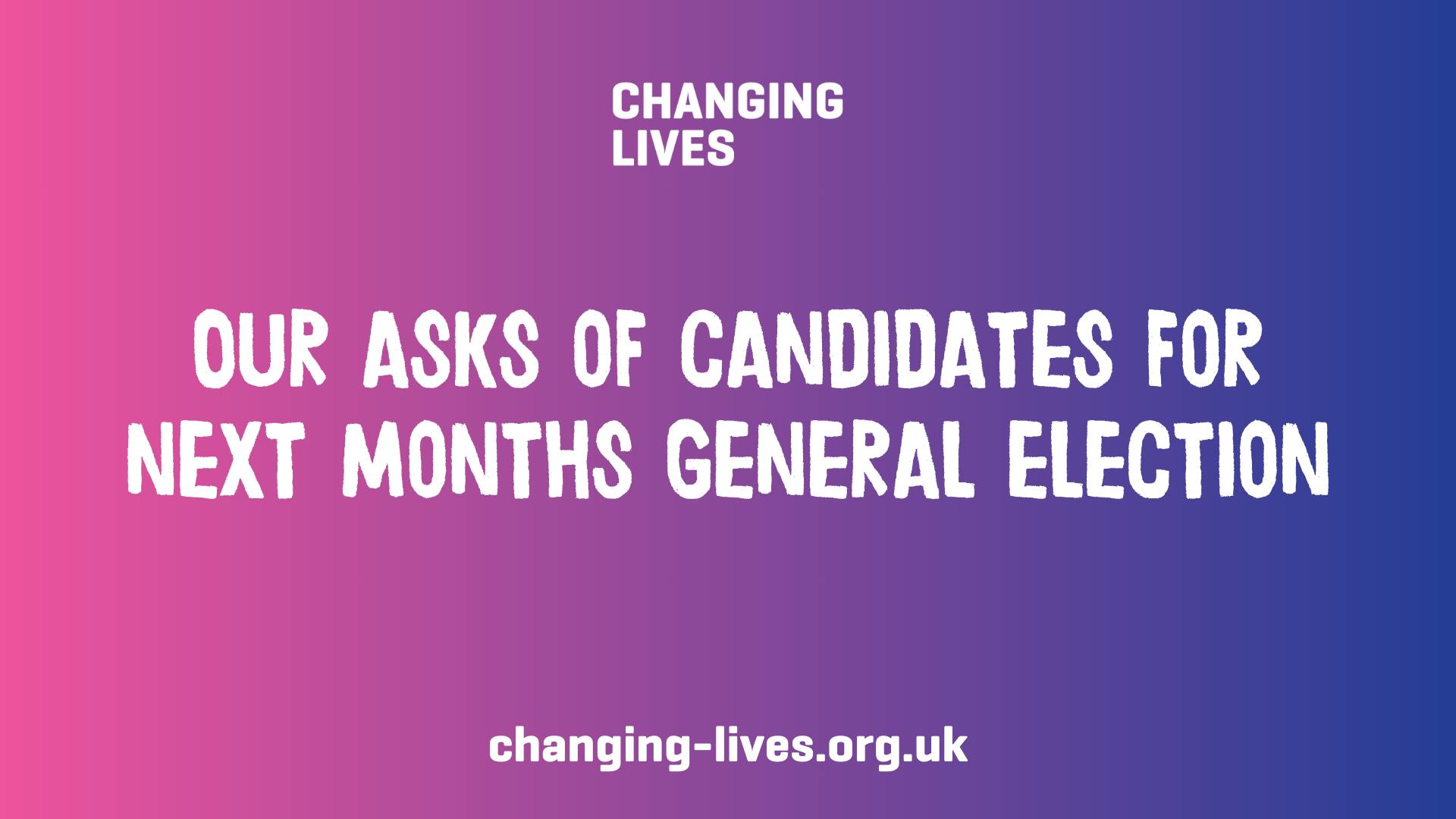Our Policy Manager Philippa Rousell breaks down what our main political parties have to say about housing and homelessness.
“Rough sleeping rose by 27% in 2023 and here at Changing Lives we are experiencing continued demand across all of our services. I hear daily ‘the system is broken’ but the general election gives us hope. Whoever may form the next government we hope they listen to the data, the evidence and the expertise within the sector, the asks are clear – be ambitious and build more social housing, ensure solutions to homelessness are diverse (one size fits all has and never will work) and ensure services like Changing Lives can continue to provide life changing support by investing seriously for the long term with ring fenced funding.”
The high levels of homelessness in this country are shocking and a damning indictment on our nation’s ability and motivation to care for those who hit hard times.
Whoever forms the next government will have the task of tackling rising levels of homelessness and rough sleeping, and the pressure that this is putting on public services. Local authorities are dealing with spiralling temporary accommodation bills, and charities that provide supported accommodation are operating on the bare bones or even having to close their doors.
This is the second of a series of blogs analysing what the main party manifestos say about themes that affect the people who access our services. We won’t be saying who to vote for, but will be comparing what each party is proposing to what we’ve been calling for in our manifesto Breaking Down Barriers.
One of the main contributors to homelessness in this country is the lack of affordable housing. People are driven into homelessness due to unaffordable rent increases, and find themselves unable to move on from temporary or supported accommodation as there is nowhere to go. We would therefore like to see ambitious targets for building new social homes and other affordable housing options.
Houses are not built overnight, so in the meantime the next government will need to consider what to do with the large number of households experiencing or at risk of homelessness and owed support by their local authority. The current system often places people in the wrong environment for their needs, and then expects them to prove themselves ‘housing ready’ without sufficient support to help them recover from trauma, deprivation and discrimination.
We believe that the key to tackling homelessness in a person-centred way is ensuring that there are options available that give people the right support at the right time. Where possible, we want to avoid people becoming institutionalised and trapped in a system, so prioritise giving people their own home with their own front door at the earliest opportunity. Some, however, require more intensive support, but are sometimes offered dispersed accommodation as the only option due to being deemed too ‘complex’ for shared facilities. Homelessness pathways need to be developed which allow people to step up into greater independence when they’re ready, but also step down into more intensive support if circumstances change or they find they’re not as ready as they thought they were.
This will mean investing in a range of property types, including dispersed properties that are not all located in the most deprived parts of towns. This needs to include single-sex provision are women are often vulnerable to abuse and exploitation in mixed-sex buildings.
We’re encouraged to see widespread ambition to build more houses, including affordable housing but are disappointed that some manifestos do not even mention homelessness.
Let’s take a look at what the main political parties have to say about housing and homelessness.
Conservative
The Conservatives have pledged to deliver 1.6 million homes with various measures to unblock housebuilding. They will also renew the Affordable Homes Programme and do more to boost the availability of affordable housing in rural areas.
They plan to implement several measures around social housing eligibility, including legislating for new Local Connection and UK connection tests and implementing a ‘three strikes and you’re out’ expectation of social landlord for anti-social behaviour.
They will bring the Renters Reform Bill back to Parliament and deliver the court reforms necessary to abolish Section 21 evictions, whilst strengthening other grounds for landlords to evict private tenants who engage in anti-social behaviour.
They will continue with plans to end rough sleeping and prevent people ending up on the streets in the first place. They will also deliver commitments under the Local Authority Housing Fund and review the quality of temporary accommodation.
Labour
Labour have pledged to deliver 1.5 million new homes over the next parliament, again with various measures to unblock housebuilding. They have a bigger focus on affordable housing, and have pledged to deliver the biggest increase in social and affordable housebuilding in a generation. This will include making changes to the Affordable Homes Programme and supporting councils and housing associations to build their capacity.
They plan to overhaul the regulation of the private rented sector and immediately abolish Section 21 evictions. They will also extend Awaab’s Law, which tackles unsafe social housing, to the private sector.
They will also develop a cross-government strategy to tackle all forms of homelessness. They do not go into more detail in the manifesto, but there have been reports that this will include creating an ‘ending homelessness unit’ in the newly created Office for the Deputy Prime Minister.
Liberal Democrats
The Liberal Democrats plan to increase building of new homes to 380,000 a year across the UK, including 150,000 social homes a year.
They will immediately ban no-fault evictions, make three-year tenancies the default, a create a national register of licensed landlords.
They plan to end rough sleeping within the next Parliament and immediately scrap the Vagrancy Act which criminalises rough sleeping. They will urgently publish a cross-Whitehall plan to end all forms of homelessness. Their specific plans to address homelessness will include exempting groups of homeless people, and those at risk of homelessness, from the Shared Accommodation Rate; introducing a ‘somewhere safe to stay’ legal duty to ensure that everyone who is at risk of sleeping rough is provided with emergency accommodation and an assessment of their needs; and ensuring that local authorities are given sufficient financial resources to deliver their duties under the Homelessness Reduction Act and other duties related to providing accommodation for survivors of domestic abuse.
Green
The Green Party plan to increase Council and Housing Association provision of social housing to 150,000 new homes a year, and would introduce legislation to give local authorities, registered social landlords and community housing groups the first option to buy certain properties. They want to end the ‘right to buy’ and empower local authorities to bring empty homes back into use. They will also push Ministers to ensure social housing stock is brought up to and kept at a decent standard, with funding for providers to get this done.
They support rent controls in areas where the local rental market is overheated, and would end Section 21 evictions and short-term leases.
Reform UK
Reform’s immediate actions to tackle the housing crisis would be to review the planning system for housebuilding; reform social housing law to prioritise local people and those who have paid into the system; and scrap the Renters’ Reform Bill. Longer term they would promote housebuilding by incentivising use of new construction technology.
As a charity, Changing Lives remains politically neutral and does not endorse any particular party or candidate. We have focused on the main parties that cover the whole of the UK, which means we have not included an analysis of the policies of parties that only operate in Wales, Scotland or Northern Ireland. This is a non-exhaustive analysis of each party’s policies.
The full manifesto of each party is available to read here: Conservative, Labour, Liberal Democrat, Green, Reform UK.






